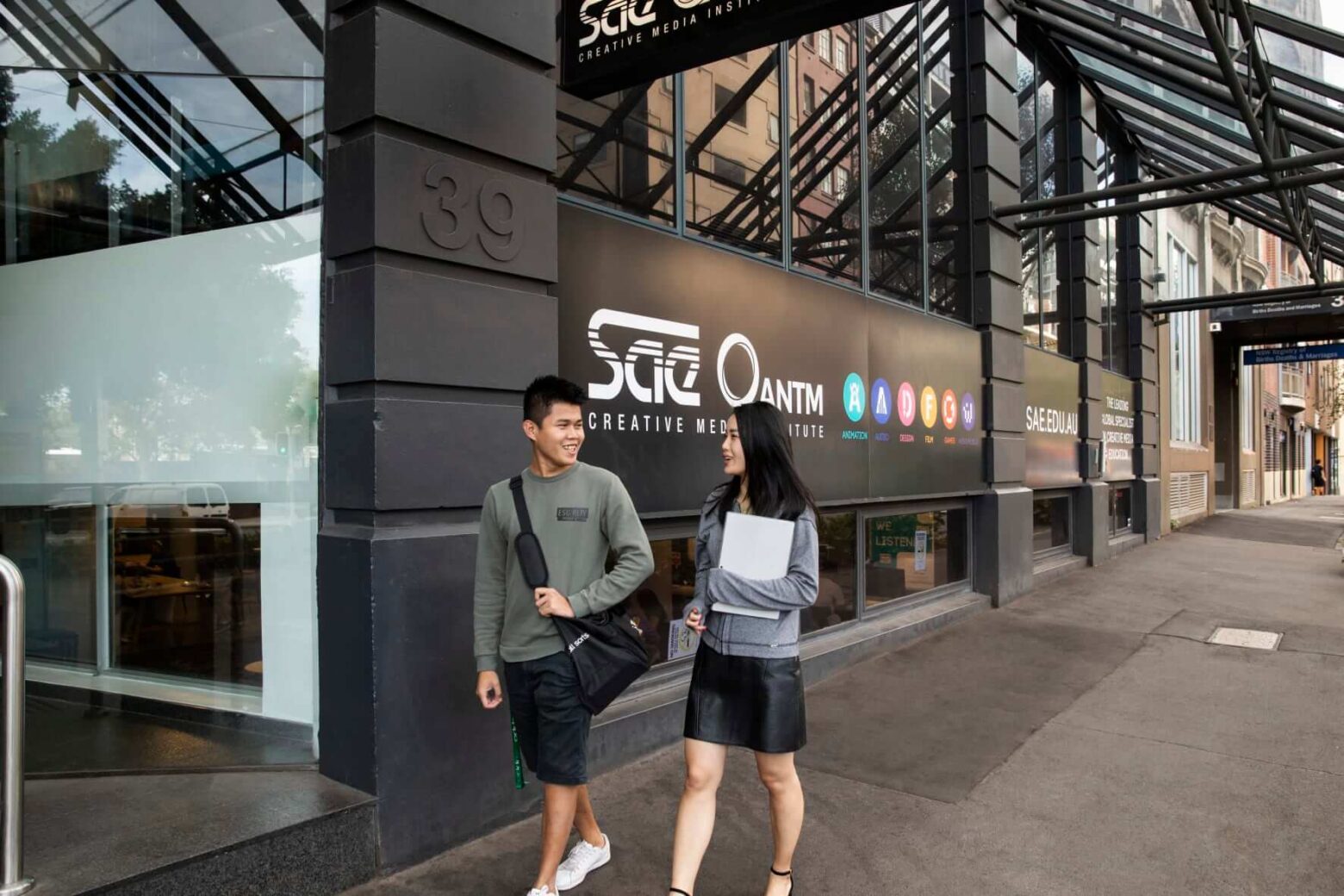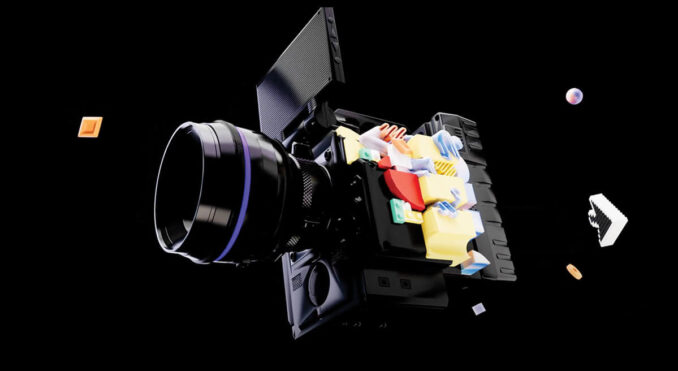Entry Requirements
International Students
If you are an Australian Resident visit SAE's domestic entry requirements.

Artwork by Marcia McGuire, a proud Whadjuk, Ballardong and Yamatji Aboriginal woman from Perth.
ACADEMIC ENTRY REQUIREMENTS
Undergraduate Academic entry Requirements
Undergraduate courses typically requires applicant to have successfully completed the Australian Senior Secondary Certificate of Education (SSCE) or equivalent.
For the full list of entry requirements for a course, refer to the individual course pages.
Don’t know if your overseas school certificate is equivalent to Australian Year 12?
Email a copy of all your education records together with your application and SAE’s International Admissions team will review and advise.
What if I did not complete Year 12 can I still get into SAE?
International students may be eligible to apply via our Experience Based Entry process. For more information, refer to the Experience Based Entry section below and the Admissions and Enrolment Procedure.
For more information email: [email protected]
postgraduate Academic entry Requirements
Applicants for postgraduate courses must typically demonstrate completion of a Bachelor’s degree issued under the Australian Qualifications Framework.
Some postgraduate courses may have additional academic entry requirements. For the full list of entry requirements, refer to the individual courses pages.
Applicants who do not have formal qualifications for entry may seek admissions via the Experience based Entry process. For more information, refer to the Experience Based Entry section below and our Admissions and Enrolment Procedure on the Policies & Procedures webpage.

EXPERIENCE BASED ENTRY
SAE recognises that preparation for study is not restricted to formal educational attainment and that valuable skills development can be gained through relevant experience.
Our Experience Based Entry Scheme allows you to be considers for entry to an undergraduate or postgraduate course through an assessment of your ability to succeed in higher education.
SAE will review applications on a case by case basis if you:
- Do not have the formal qualifications required for direct entry
- Seek admission to a course based on educational and skills development through professional, work and/or life experience, creative practice and/or non-accredited study.
To apply via Experience Based Entry, you are required to undertake an interview with an assigned representative of SAE and provide supporting evidence that may include:
Records of any formal qualifications attained;
- Records of any formal qualifications
- Evidence of any informal studies undertaken;
- A resume or Curriculum Vitae (including names of referees) referring to work history and/or creative practice and/or volunteer or community engagement (if applicable);
- A 200-300 word written statement describing your background, experience and aspirations in the creative industries;
- Evidence of relevant materials that demonstrates creative aptitude, knowledge, technical skills and abilities
In addition, you may also be asked to undertake an exam or written assignment to satisfactorily demonstrate capacity to meet the course requirements or provide examples and/or a portfolio of work.
ENGLISH LANGUAGE REQUIREMENTS
English language tests must have been completed within the past two years. Multiple test results cannot be combined to meet the minimum requirements. SAE does not recognise IELTS Academic tests completed online.
The table below shows how other accepted tests compare with IELTS Academic test scores.
| IELTS | PTE | CAE | TOEFL (iBT) | CLB | LanguageCert Academic | MET 4-skill test |
|---|---|---|---|---|---|---|
| 5.5 | 46 | 162 | 51-66 | 6 | 54-60 | 49-52 |
| 6.0 | 52 | 169 | 67-80 | 7 | 61-66 | 53-57 |
| 6.5 | 59 | 176 | 81-90 | 8 | 67-72 | 58-61 |
| 7.0 | 66 | 185 | 91-99 | 9 | 73-80 | 62-66 |
SAE requires that PTE-A scores include the achievement of minimum sub element scores to meet the overall score, as indicated in the table below:
Pearson PTE Academic Scores
| IELTS Academic | PTE-A Overall | PTE-A Listening | PTE-A Reading | PTE-A Speaking | PTE-A Writing |
|---|---|---|---|---|---|
| 5.5 | 46 | 43 | 48 | 42 | 51 |
| 6.0 | 52 | 48 | 54 | 46 | 62 |
| 6.5 | 59 | 57 | 61 | 54 | 74 |
| 7.0 | 66 | 66 | 68 | 65 | 82 |
Canadian Language Benchmark (CLB)
The IELTS to Canadian Language Benchmark (CLB) table below shows how the scores for IELTS sub-elements can differ across each level. This is important when admission requirements specify minimum IELTS scores for each sub-element.
| CLB Level | IELTS Reading | IELTS Writing | IELTS Listening | IELTS Speaking |
|---|---|---|---|---|
| 10 | 8.0 | 7.5 | 8.5 | 7.5 |
| 9 | 7.0 | 7.0 | 8.0 | 7.0 |
| 8 | 6.5 | 6.5 | 7.5 | 6.5 |
| 7 | 6.0 | 6.0 | 6.0 | 6.0 |
| 6 | 5.0 | 5.5 | 5.5 | 5.5 |
| 5 | 4.0 | 5.0 | 5.0 | 5.0 |
| 4 | 3.5 | 4.0 | 4.5 | 4.0 |
TOEFL iBT
The IELTS to TOEFL iBT table that follows, shows how the scores for IELTS sub-element can differ across each level. This is important when admission requirements specify minimum IELTS scores for each sub-element.
| IELTS Academic | TOEFL iBT Listening | TOEFL iBT Reading | TOEFL iBT Writing | TOEFL iBT Speaking |
|---|---|---|---|---|
| 5.5 | 12-15 | 12-15 | 14-18 | 17-18 |
| 6.0 | 16-18 | 16-18 | 19-22 | 19-21 |
| 6.5 | 19-21 | 19-21 | 23-25 | 22-23 |
| 7.0 | 22-23 | 22-24 | 26-27 | 24-25 |
LANGUAGECERT
The IELTS to LANGUAGECERT table that follows, shows how the scores for IELTS sub-element can differ across each level. This is important when admission requirements specify minimum IELTS scores for each sub-element.
| IELTS Academic | LANGUAGECERT Listening | LANGUAGECERT Reading | LANGUAGECERT Writing | LANGUAGECERT Speaking |
|---|---|---|---|---|
| 5.5 | 49-56 | 54-59 | 56-63 | 62-69 |
| 6.0 | 57-61 | 60-64 | 64-70 | 70-75 |
| 6.5 | 62-66 | 65-70 | 71-77 | 76-81 |
| 7.0 | 67-72 | 71-76 | 78-83 | 82-86 |
Michigan English Test (MET)
The IELTS to Michigan English Test (MET) table that follows, shows how the scores for IELTS sub-element can differ across each level. This is important when admission requirements specify minimum IELTS scores for each sub-element.
| IELTS Academic | MET Listening | MET Reading | MET Writing | MET Speaking |
|---|---|---|---|---|
| 5.5 | 53-55 | 51-54 | 51-56 | 43-47 |
| 6.0 | 56-58 | 55-58 | 57-63 | 48-52 |
| 6.5 | 59-60 | 59-62 | 64-73 | 53-58 |
| 7.0 | 61-63 | 63-66 | 74-78 | 59-66 |


































